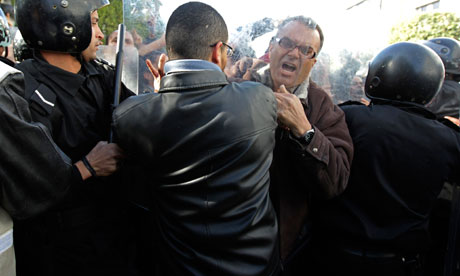For too long, Arab elites have justified dictatorship on the grounds that the alternative is chaos or religious fundamentalism
By Issandr El Amrani
This commentary was published in The Guardian on 18/01/2011

The elation felt across the Arab world over the Tunisian uprising is deep and palpable. It is not simply that, like most people, Arabs are pleased to see a long-repressed people finally have a shot at gaining their freedom. It is also that many recognise themselves in the Tunisian people and share their hopes, their fears, and also their guilt.
Living in a dictatorship is not simply about shutting up and putting up. It is a humiliation, an abasement of the human spirit, that is reinforced on a daily basis. Every time you lower your voice when mentioning a political leader, every time you shrug off rampant corruption as a fact of life that has no redress, every time you bend the rules in a country where connections systematically trump the rule of law, every time you consider emigration simply to get away from the ambient mediocrity and stasis, you forfeit a little piece of dignity.
Tunisians lived this way for decades, and the Ben Ali regime, which inspired such dread, turned out to be rotten and hollow. This small, well-educated and relatively prosperous country of 10 million – despite the rioting, looting and score-settling that has taken place over the past week – has a real chance at making an unprecedented breakthrough for this region and become genuinely democratic. And if successful, this breakthrough will have been made in spite of western support for the Tunisian regime, and without palace plots and military adventurism. It may yet turn out to be the genuine item, a progressive popular revolution.
What unfolds in Tunisia over the next few weeks may inspire others in the region, and make them believe that change is possible. Yet, at the same time, even the relatively small amount of rioting and looting that has taken place reminded many of the chaos that ensued in Iraq after the 2003 US-led invasion. The Arab regimes have excelled at justifying their dictatorship using the argument that the alternative is either chaos or religious fundamentalism. They have methodically created political vacuums and societies that are torn by socio-economic, ethnic and sectarian tensions.
Only caring about their longevity – and in many cases, reduced to glorified tribal chieftains – many Arab leaders, with the complicity of part of their populations, have created a situation where the type of uprising seen in Tunisia could unleash tremendous destructive forces. This has been their insurance policy, the booby-trap they have laid in anticipation of a moment like this. They have survived by preying on the fear of one another that they have cultivated among their people.
If some Tunisians, enraged at the privilege of their elite, burned car dealerships in Tunis's tonier districts in the last few days, what would happen in Cairo, one of the densest cities in the world, where over half of the city lives in slums and economic inequality feeds seething class resentment? Or Algeria, where civil war is a fresh wound? Or failed states like Northern Sudan or Yemen? The memory of Iraq's civil war is too fresh in the Arab imagination not to ask these questions – and an effective tool in the hands of the regimes to terrify many into thinking that the alternative to dictatorship is pandemonium.
Tunisia's revolution, to become contagious, must be both peaceful and mark a real break. It must find the balance between punishing those who backed the Ben Ali regime and forgiveness for those who, in myriad ways, took part in a system that sometimes left them little choice. It must show that democracy and stability are not incompatible on Arab soil. It must boost the arguments made by the likes of the Egyptian opposition figure and Nobel laureate Mohamed ElBaradei that, on their current paths, many Arab regimes are heading towards an ugly dead end.
The Tunisian example may or may not inspire popular uprisings elsewhere. But it should send a loud and clear message to largely politically disengaged and complicit Arab elites that, if they do not start pushing for peaceful change now, what happened in Tunisia could happen in their country. The outcome, though, might be much uglier.
No comments:
Post a Comment